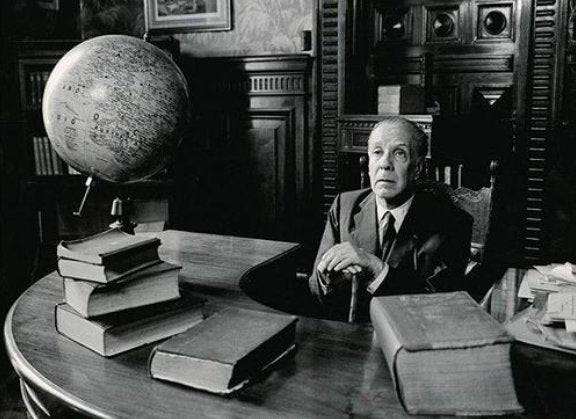
Mirror
Share
Borges said in a poem that art is like a mirror, showing us our own face. In another poem, he wrote that the moon every night is a mirror of the past.
Borges likes to talk about mirrors, but mirrors are not what he likes. He said that mirrors, like marriage, can increase the population. I don't know why he doesn't like crowds, even the figures in the mirror have to be rejected. Maybe two people are too much in his maze; or people are not the most interesting thing in his fictional world.
Although Borge said that he does not like mirrors, when he regards art as a mirror and sees his face in it, I believe he will be fascinated by this reflection; in addition, the ancient mirror of the moon also makes him See the timeless nature of time. In this mirror, time has not passed, and things have not disappeared, so we can clearly see the past. This "mirror" consisting of countless moments can also be seen as a multiplication of time-it clearly shows time, but every time we see it is the shadow of time.
What the mirror refers to in imagery is probably only reflected in poetry, and it is not easy to interpret. But it is very obvious that all metaphors about mirrors involve themselves. Seeing yourself in the mirror of art and the past in the mirror of the moon are undoubtedly "I" things. Some people say that Borges is a solipsist. If this is the case, it is not difficult to explain his disgust and obsession with mirrors-because of ego, he does not like to be copied, even if it is an illusory copy. With a few mirrors, he will be infinitely copied. Similarly, because of me alone, he likes to see symbols and marks related to himself anywhere in the mirror. For example, in art, history, maps, streets, butterflies, and even the crowd. Because everything that makes up the world, everything that is shared by humans will magically imprint his mark in the reflection of the mirror. In addition, if he is a thorough solipsist, these things also constitute and enrich his loneliness.
Borges once said in an interview that he had committed the biggest sin that anyone could commit, and that he had never felt happy. Regarding unhappiness as the greatest sin in the world, Borges is indeed very egoistic. At least in his world, what is sin and happiness must be defined by him. I don't know what mirror he saw sin and happiness in, but I believe that it must be an illusion mirror that reveals sin; and in his heart, there may be another obscure old bronze mirror related to emotions that keeps him always Can't see the look of happiness.
Borges likes to talk about mirrors, but mirrors are not what he likes. He said that mirrors, like marriage, can increase the population. I don't know why he doesn't like crowds, even the figures in the mirror have to be rejected. Maybe two people are too much in his maze; or people are not the most interesting thing in his fictional world.
Although Borge said that he does not like mirrors, when he regards art as a mirror and sees his face in it, I believe he will be fascinated by this reflection; in addition, the ancient mirror of the moon also makes him See the timeless nature of time. In this mirror, time has not passed, and things have not disappeared, so we can clearly see the past. This "mirror" consisting of countless moments can also be seen as a multiplication of time-it clearly shows time, but every time we see it is the shadow of time.
What the mirror refers to in imagery is probably only reflected in poetry, and it is not easy to interpret. But it is very obvious that all metaphors about mirrors involve themselves. Seeing yourself in the mirror of art and the past in the mirror of the moon are undoubtedly "I" things. Some people say that Borges is a solipsist. If this is the case, it is not difficult to explain his disgust and obsession with mirrors-because of ego, he does not like to be copied, even if it is an illusory copy. With a few mirrors, he will be infinitely copied. Similarly, because of me alone, he likes to see symbols and marks related to himself anywhere in the mirror. For example, in art, history, maps, streets, butterflies, and even the crowd. Because everything that makes up the world, everything that is shared by humans will magically imprint his mark in the reflection of the mirror. In addition, if he is a thorough solipsist, these things also constitute and enrich his loneliness.
Borges once said in an interview that he had committed the biggest sin that anyone could commit, and that he had never felt happy. Regarding unhappiness as the greatest sin in the world, Borges is indeed very egoistic. At least in his world, what is sin and happiness must be defined by him. I don't know what mirror he saw sin and happiness in, but I believe that it must be an illusion mirror that reveals sin; and in his heart, there may be another obscure old bronze mirror related to emotions that keeps him always Can't see the look of happiness.